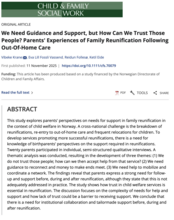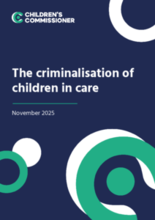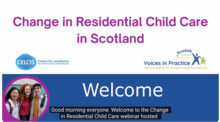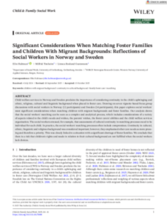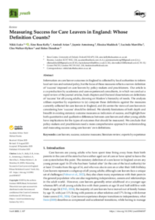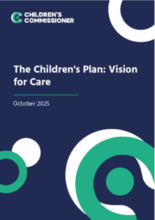

Displaying 21 - 30 of 1643
This study examines Norwegian birth parents’ perspectives on the support they need for successful family reunification, revealing significant gaps in guidance, financial assistance, and help mobilizing social networks. The findings underscore that low trust in child welfare services can hinder parents’ willingness to accept support, highlighting the need for stronger institutional collaboration and tailored assistance before, during, and after reunification.
The Children’s Commissioner’s report “The Criminalisation of Children in Care” reveals a deeply concerning pattern: children in care in the UK are disproportionately drawn into the criminal justice system, often for low-level incidents that, in a family setting, would be handled without police involvement. To address this, the Commissioner calls for a strengthened, statutory protocol among police, local authorities, and youth services; better diversion pathways; a more child-friendly prosecution process; increased legal aid and training; more stable, high-quality care placements; and improved data sharing to monitor and prevent harmful police involvement.
CELCIS’ October 2025 webinar explored recent developments in residential child care across Scotland, featuring insights on nurture-based practice, shifts in inspection approaches aligned with The Promise, and staff development through reflective practice. Speakers highlighted how new care models, regulatory changes, and whole-system approaches are strengthening practice and improving outcomes for children and young people.
This article reports a 45% increase in the number of children in England waiting for adoption since 2022, while the number of approved adopters has fallen by around 42%.
This article from CELCIS explores the Scottish Government’s consultation on creating a universal definition of “care experience”, advocating for language and policy that reflect diverse cultural contexts—including those of people from the Global S
This study, based on vignette-based focus group discussions with social workers in Norway and Sweden, examines how they balance children’s cultural, ethnic, religious, and linguistic continuity with other needs when matching migrant-background children with foster families, revealing a complex process shaped by the child’s and parents’ wishes, foster carers’ capacities, and organizational constraints. While social workers value cultural continuity, they often prioritize more urgent care needs—especially amid a significant shortage of foster families—creating a risk that children’s rights and needs related to their cultural background may not be fully met.
This article reviews how ‘success’ is defined for young adults, comparing academic and care-experienced perspectives with the narrow statutory outcome measures currently used for care leavers in England. It finds that existing measures are limited and advocates for a more comprehensive approach that centers care leavers’ own definitions of success.
This report assesses Scotland’s efforts to fulfil The Promise—a national commitment made in 2020 to overhaul the country’s care system so children and young people “grow up loved, safe and respected.” It identifies significant persistent challenges in three key areas: governance and accountability, data and measurement, and resources and investment.
This report from the UK Children’s Commissioner, Dame Rachel de Souza, reviews progress and challenges in children’s social care since she began her term in 2021. It highlights persistent failures to uphold children’s rights and presents a vision for transformative reform centered on those rights.
The article argues that the system of children’s residential care in the UK is failing to meet the needs of young people, pointing to persistent evidence that many children do worse in residential homes than in alternative arrangements.

